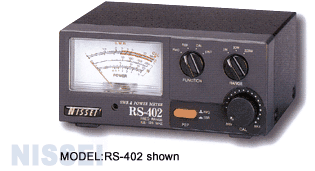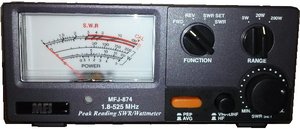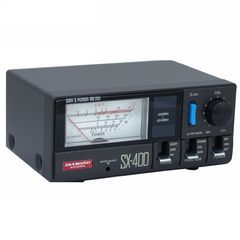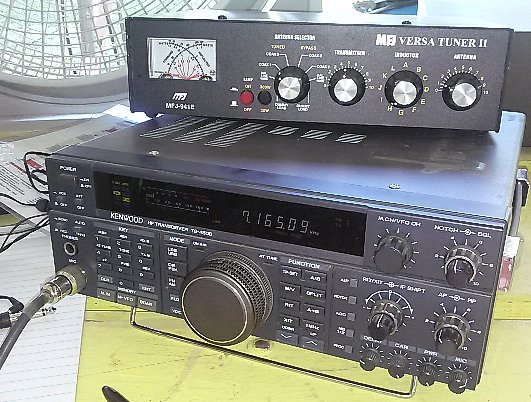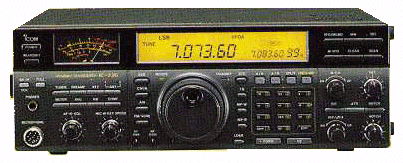User talk:W0DBW: Difference between revisions
→tropospheric ducting: new section |
|||
| Line 544: | Line 544: | ||
kd0cvg Ed Omaha NE | kd0cvg Ed Omaha NE | ||
== | ==VHF Propagation== | ||
===tropospheric ducting=== | |||
[http://www.engineeringradio.us/blog/2010/05/e-skip-tropospheric-ducting-and-other-vhf-propagation-phenomena/ E-skip, tropospheric ducting and other VHF propagation phenomena] | [http://www.engineeringradio.us/blog/2010/05/e-skip-tropospheric-ducting-and-other-vhf-propagation-phenomena/ E-skip, tropospheric ducting and other VHF propagation phenomena] | ||
By Paul Thurst | By Paul Thurst | ||
| Line 576: | Line 575: | ||
Occasionally, solar storms will effect communications on all frequencies. The last time I heard this was in the last sun spot peak around 2000 or so. I was listening to the radio and all the stations faded for several seconds. It turns out a huge solar flare had erupted and send a stream of particles through the Earth’s atmosphere. I happened to be driving down the road and immediately my cell phone started ringing. Listening to the panicked program director on the other end, you’dve thought the earth has stopped spinning on it’s axis. Anyway, it does happen once in a while. | Occasionally, solar storms will effect communications on all frequencies. The last time I heard this was in the last sun spot peak around 2000 or so. I was listening to the radio and all the stations faded for several seconds. It turns out a huge solar flare had erupted and send a stream of particles through the Earth’s atmosphere. I happened to be driving down the road and immediately my cell phone started ringing. Listening to the panicked program director on the other end, you’dve thought the earth has stopped spinning on it’s axis. Anyway, it does happen once in a while. | ||
Be Sociable, Share! | Be Sociable, Share! | ||
===VHF Propagation Map=== | |||
link: [http://aprs.mountainlake.k12.mn.us/ VHF Propagation Map] | |||
Revision as of 17:36, 23 July 2017
articles to read
explore
My new CLICK ME banner
USED MARKET PRICE WATCH
$336 2015 Alinco DX-70T Used fair condition $390 2015 Alinco DX-70T Used excellent condition $391 2014 Alinco DX-70T Used excellent condition
$150 2014 Drake TR-7 Used fair condition $366 2015 Drake TR-7 Used fair condition $400 2014 Drake TR-7 Used good condition $430 2015 Drake TR-7 Used excellent condition
$425 2015 ICOM IC-718 HF Used excellent condition $435 2015 ICOM IC-718 HF Used excellent condition $485 2015 ICOM IC-718 HF Used excellent condition $371 2015 ICOM IC-735 Used good condition $380 2015 ICOM IC-735 Used good condition $385 2015 ICOM IC-738 Used good condition $395 2015 ICOM IC-751A Used good condition
$658 2015 Kenwood TS-850SAT Used excellent condition $685 2015 Kenwood TS-850SAT Used excellent condition $615 2015 Kenwood TS-940S Used excellent condition
$340 2014 Yaesu FT 840 Used excellent condition $321 2015 Yaesu FT 8900 Quad Band Used excellent condition $610 2015 Yaesu FT 897 Used excellent condition $511 2015 Yaesu FT-990 Used good condition $575 2015 Yaesu FT-990 Used excellent condition $592 2015 Yaesu FT-990 Used excellent condition $610 2015 Yaesu FT-990 Used excellent condition $655 2015 Yaesu FT-990 Used refurbished
BASED ON KNOWN PRICE RANGES
$330 - $390 Alinco DX-70T $330 - $510 Icom IC-2820H
NISSEI RS-502
SWR/POWER METER with 5/20/200W scale 1,8-525MHz with monitoring forward power, reverse power and SWR reading.
Main features: Large meter display for ease of reading, Forward RF power readings, switchable to indicate either AVG average, power or Peak Envelope Power(PEP) for SSB and AM transmitters, Reflected RF Power readings, VSWR ratios and calibration meter, Dual connectors SO-239: 1,8-200MHz and 125-525MHz. I/O Impedance: 50 ohm, Illuminated meter.
Weight: 0,950Kgr. Dimensions: 190x85x135 mm.
MFJ-874
This looks a lot like the Nissei, however, is MFJ brand. This has one extra button to select VHF/UHF or HF.
Diamond SX-400
Diamond power meter SX-400 5w 20w 200w 400w Power and SWR Meter - The SX400 measures forward and reflected power and VSWR. Compact size makes meter useful for testing both base and mobile installations.
Special Features: Illuminated meter, Switchable r.m.s. or peak power, Measures forward, reflected & VSWR power. Dimensions 6"W x 2"H x 4"D, 2 lbs.
Specifications: 140-525 MHz at 5, 20, or 200 watts. Connector SO-239, Minimum power required to SWR test is 4 watts.
Merchants
Online merchants
- http://www.gigaparts.com/ - Gigaparts receives mostly favorable reviews.
- DX Engineering - mostly favorable. won't price match.
Many merchant reviews can be found at the eHam Company Reviews forum from other HAM operators sharing their experiences.
club equipment
Some of the equipment I was able to operate by the kind provision of our local radio club.
- Kenwood TS-450S
Drake TR-7
later model with a serial number 89xx
Software Defined Radio (SDR)
- SoftRock RXTX 30-20-17 meter SDR transceiver QRP
- SoftRock RXTX 15-12-10 meter SDR transceiver QRP
GMSK(digital)
Gaussian Minimum Shift Keying or Gaussian filtered Minimum Shift Keying, GMSK, the form of modulation with no phase discontinuities used to provide data transmission with efficient spectrum usage.
- Icom ID-800H Digital Dual Band Mobile Transceiver with D-Star
Purchase Consideration
Equipment I do not own but have been researching and in consideration for purchasing. If I make a purchase I will use and follow up with a review of the product. We like to do product reviews here.
Test Equipment
I like the roller inductor style operation of antenna tuners for HF, however, I don't need a model that handles 1.21 gigawatts! Been looking around to see if there is a less expensive version of these.
Also noticed MFJ gets a lot of negative reviews. Our club uses MFJ tuners, they seem to work.
- MFJ 969 Antenna Tuner - has roller inductor. $200 new. 6 thru 160 Meter HF Bands (1.7Mhz To 55Mhz). 300 Watts.
- MFJ-986 Antenna Tuner - roller inductor, high wattage. $330 new. 1.8 - 30 MHz, 3000 Watts
Transceivers
ICOM IC-736 - 160 to 6 meter
Expand your horizons to 6 meters with the Icom IC-736. It also covers 30, 17 and 12 meters. This all band transceiver features a 500 kHz to 30 MHz general coverage receiver. The 736 has a built-in HF and 6 meter antenna tuner. Enjoy 5 to 100 watts full duty RF power input in SSB/CW/FM (40W AM) modes, even on 6 meters. For CW operators full and semi break-in is supported.
160-6 Meter Transceiver w/built-in tuner . Maybe in production? Absence of receive coverage from 30MHz to 45MHz. 6-meter is technically (50-54 MHz) so the gap exists in non Ham freqs. The lack of receive between 30MHz and 45MHz and the CW tuning arrangement are the most notable disadvantages.
Information on Universal-Radio Discontinued HF Transceivers including band coverage.
Icom IC-718 HF - A Modern Full Mode HF Transceiver
This one is still in production. It's straightforward easy to operate modern HF rig.
0.03-29.999999 MHz* general coverage receive capability. *Guaranteed range: 0.5-29.999999 MHz
Yaesu FT 980
The Yaesu FT-980 is a deluxe HF transceiver covering 160 to 10 meters amateur bands in SSB, CW, FM and AM Modes. This radio features two independent receiver front ends. One is for general coverage receive from 150 kHz to 29.99999 MHz and the other for the amateur bands only. Seven JFETs are employed to provide extraordinary dynamic range. Ten VCOs are used over the local signal range to secure a low carrier-to-noise ratio. A three-step attenuator is provided to deal with the very strong signals. The triple conversion design incorporates four cascaded stages of IF filtering for all modes. Twelve memory channels are available. Using push-pull MRF422 final transistors, rated at 280 watts each, the transmitter coasts along at 100 watts output. Full break-in QSK is provided for CW operation.
I'm not a fan of push button and menus. I like independent pots.
TYT TH-9800 Quad Band
TRANSCEIVER, 29/50/2M/70CM, CROSS BAND, 50 WATT - Yeah one of them there CHINA knockoffs. However, for the price this little guy does a lot. I've read quality many vary widely as is the case with this Chinese stuff. I am looking at one now that has been fully tested at a shop in the United States. They are also being sold on Amazon.com
Scanners
Antennas
2m/440 dual band needed for VHF UHF operation.
mobile:
- Larsen NMO2/70
base station:
- J-Pole for 2-meters and 70-cm - can be built "homebrew" which I like to do.
- DIAMOND X-50 2m/440 ANTENNA
- Cushcraft Ringo Ranger Vertical Antennas ARX2
6-meter
- Squalo, see: http://www.pa3hcm.nl/?p=312
Below 10-meter
- Sloper 1/4 wave, see: http://www.alphadeltacom.com/qw_slopers.html
Technician Class on HF below 50MHz
SSB (Single Sideband)
- 10-meters 28.300 – 28.500
CW Morse Code
- 80-meters 3.525 – 3.600
- 40-meters 7.025 – 7.125
- 15-meters 21.025 – 21.200
- 10-meters 28.000 – 28.500
resources:
Plattsmouth Police and Trunktracking
Frequency License Type Tone Alpha Tag Description Mode Tag ---------------------------------------------------------------------------------------------------------------------------- 853.30000 WQET706 RM 156.7 PL CassSoNEDisp Sheriff - Plattsmouth Tower FMN Law Dispatch 853.87500 WQET706 RM 048 NAC CassSoSEDisp Sheriff - Murray Tower P25 Law Dispatch 39.68000 WZC542 M CassSo C2C Sheriff Car to Car FM Law Talk 153.89000 BM 123.0 PL Cass Co Jail Cass County Jail FMN Corrections 154.38500 WNXN466 RM 114.8 PL Cass Co Fire County Fire Dispatch FMN Fire Dispatch 151.10000 KIZ260 RM 110.9 PL CassCoRoads1 Highway Dept. 1 FM Public Works 151.10000 KIZ260 RM 465 DPL CassCoRoads2 Highway Dept. 2 FM Public Works 851.40000 WQET706 RM 156.7 PL Platts PD-A Police - Analog FMN Law Dispatch 851.40000 WQET706 RM 048 NAC Platts PD-D Police - Digtial P25 Law Dispatch 39.76000 KSQ696 M PlattsPD-Car Police 4 - Car to Car FMN Law Talk 155.49000 KSQ696 BM 107.2 PL PlattsPD-VHF Police FM Law Dispatch 159.25500 WPSF346 RM 606 DPL Platts FD 1 Fire Dispatch FMN Fire Dispatch 153.92000 WPSF346 M 565 DPL Platts FD 2 Fire TAC 1 FMN Fire-Tac 158.88000 WPSF346 M 654 DPL Platts FD 3 Fire TAC 2 FMN Fire-Tac ----------------------------------------------------------------------------------------------------------------------------
antenna height calculator
- http://www.csgnetwork.com/antennagenericfreqlencalc.html
- http://www.csgnetwork.com/antennaevcalc.html
- https://www.easycalculation.com/physics/electromagnetism/antenna-wavelength.php
antenna analyzer
Software Antenna Analyzer
- MAX6 - 1 MHz up to 500 MHz, Get the 8 button version
- W4RT miniVNA / mini Radio Solutions miniVNA - 0.1 to 180 MHz, USB to PC ($400)
- Timewave TZ-900s
Standalone Antenna Analyzer
- AW07A HF/VHF/UHF sold under SainSonic and Feature Tech - $220 new w free shipping - also known as SainSonic RA-07A
- Comet CAA-500MARKII Antenna Analyzer ($389.95) 1.8-500 MHz, LCD Color Screen, Dial Tune Knob, UHF & Type-N Connector, 8-16 V, Each
Additional Information
Look for hf vhf uhf antenna analyzer
Clear Channel Ranger AR-3500
I own a 100w model Clear Channel AR-3500. They were available in a lower 30w version (I think) and a more powerful 100w version. The 100w version has massive heatsink fins on the rear with the longest two on both ends. It is easy to tell them apart. I have been thinking about selling it as I no longer do much on 10-meter. I've been watching prices to get an idea of what I would want for mine if I decide to sell it.
CLEAR CHANNEL RANGER AR-3500 100W MODEL USED PRICES
$233 2015 Clear Channel Ranger AR-3500 Used fair condition $255 2015 Clear Channel Ranger AR-3500 Used good condition $289 2015 Clear Channel Ranger AR-3500 Used fair condition $332 2015 Clear Channel Ranger AR-3500 Used good condition
My Kenwood Part 90 Radios
Kenwood TK 880H
- Frequency: UHF
- Band: 450-490 Mhz
- Power: 40 Watts
- Channels: 600
- Narrow Band: Yes
Kenwood TK 380
- UHF TK-380K 512 Channel Radio (w/Version 2.0 Firmware)
- High Capacity Battery - NEW (NiCd, 1500 mAh, KNB-17 Compatable)
- Desk Top Charger (KSC-15)
- Standard Antenna (UHF Low Profile Helical - KRA-27M)
- Spring Action Belt Clip (KBH-10)
Coaxial Cable Index
See: Coax Cable for Ham Radio Applications
Microreader
decodes cw and displays text. listen to cw without knowing Morris code.
- ERA Microreader MKII CW Decoder - a stand alone solid state cw decoder circa 1980s that works well.
MFJ Tuners
- MFJ-906 - 6m tuner
- MFJ MFJ-921 - 2m/1.25m tuner
Tools You Will Need for Electronic Service
- Desoldering pump - desolder vacuum to remove heated solder
- Helping hand - weighted base and clamps to hold boards into place
November 2015 Log
11/22/2015 kc0mfw on 146.790
146.790 CRESTON is linked with other Iowa repeaters, including 442.400 ARISPE.
146.790 - K0CSQ 136.5 Creston Iowa Southwest Iowa Amateur Radio Association Repeater ...
442.400 with PL 151.400 +5Mhz offset
NOAA Iowa Skywarn repeater network.
- Are they part of http://swiradio.org/ants/ ?
aa0os w0hn n0vpr n0gmh n0fhq n0oru ka0rde - bedford w0jw - kb0nyg w0sms - Bob kd0twe - bedford ke0efn - urbandale kn0wme - des moines kc0mfw - Jason kd0mrd kd0sj kd0wrq wk0ff kb0owm kb0nyh
local business frequency chart
Walmart on Cornhusker highway in Bellevue ... MURS 4 ... 154.570 MHz ... Blue Dot
Mobile Radio OOBM
YAESU FT-7900R .......... OOBM(yes) ............. G(unknown) Yaesu FT-857D ........... OOBM(yes) ............. G(unknown) Kenwood TM 733A ......... OOBM(yes) ............. G(yes)
AREA NETS (unknown status)
Monday
7:00 PM 145.29 South-West Iowa ARES Glenwood, IA. 8:00 PM 144.25 NE Missouri SWOT. 9:00 PM 146.94 AARC Chat Net. Ak-Sar-Ben ARC Omaha, NE.
Tuesday
7:00 PM 147.36 QCWA Net, Chapter 210 (seasonal, October through March). 8:00 PM 50.2 6m SSB Net. 9:00 PM 145.31 Washington Co. ARES Washington Co, NE.
Wednesday
7:00 PM 146.67 Dodge Co. ARES Dodge Co, NE. 7:30 PM 7.122 CW Four State QRP Comfortable Net. 8:00 PM 3.564 CW Four State QRP Comfortable Net. 8:00 PM 145.31 Saunders Co. ARES Saunders Co, NE. 8:30 PM 7.122 CW Four State QRP Comfortable Net. 9:00 PM 3.5805 PSK Four State QRP Comfortable Net. 9:00 PM 146.82 Pottawattamie County ARES Council Bluffs, IA.
Thursday
8:30 AM 7.122 CW Four State QRP 40M Morning Net. 7:30 PM -145.31 Lincoln/Omaha SATERN Net. Ashland, NE. 8:00 PM 28.35 10-Meter Net. 8:00 PM 144.25 2-Meter SSB Net. 8:00 PM 146.36 Heartland DX Association. 9:00 PM 28.305 10-Meter Net.
Saturday
12:00 PM 146.82 Swap Net Council Bluffs, IA. 8:30 PM 3.921.000 QCWA Chapter 20.
Sunday
8:00 AM 3.902.500 Swap Net. 8:30 AM 3.896.500 3900 Club. 8:30 PM 443.925+ (103.5 tone) IRLP Net. 9:00 PM -146.94 Douglas Co. ARES net, KØUSA repeater.
source: http://www.aksarbenarc.org/main/index.php/area-nets
field day
2016 ARRL Field Day is June 25-26
Grid Square Map
Links
http://gatorradio.org/Operating_Training_Aides/Ham_US_Grids%202005.pdf
https://www.qrz.com/gridmapper
HF NETS TO LOOK UP
14.300 maritime net
14.300 MHz has become a very well known frequency in the Amatuer Radio world. There are three major nets in the Western Hemisphere that operate on 14.300 MHz. From early morning until late evening the frequency is busy with traffiic of one form or another. Begining at 0700 ET daily, The Intercon Net, formally know as The Intercontinental Amatuer Traffic Net, starts out the day. Intercon runs until 1200 ET before handing the frequency over to The Maritime Mobile Service Network. The MMSN, which also runs daily, operates from 1200 ET until 9 PM EST / 10 PM EDT or 0200 UTC. After The MMSN raps up The Pacific Seafarers Net begins operation at 10 PM EST / 11PM EDT or 0300 UTC and runs various lengths of time, depending on traffic load, but usually about 2 hours or less.
YL International Single Sideband System
14.332 MHz net.
kq0j Joel provided this local net list
Mon-Fri 0730 3.982 NE Morning Net Mon-Fri 1230 3.982 Cornhusker Net Mon-Fri 1300 7.282 Nebraska Net Mon-Fri 1830 3.982 NE Storm Net Daily 1930 1.995 160 M Neb Wx net ( daylight savings time only) Mon-Fri-Sunday 2100 146.76 Eastern NE ARES Monday 2100 146.94 Aksarben Net Tuesday 2000 50.200 6M Omaha area SSB Net Wednesday 2100 146.82 Pottawattamie County ARES Saturday 1200 146.82 Swap Net Sunday 2100 146.94 Midlands ARES Net Sunday 0830 3.982 ARES Net
Local D-star frequencies
145.175 Omaha KD0CGR/c 146.895 Papilion KA0OAU/c 442.125 Omaha KD0CGR/b 145.250 Lincoln W0MAO/c
Note: Omaha VHF and Lincoln is perma-linked to 2C
HF TUNER SETTINGS MFJ-941E
[10-meter convertable: short] 10m 7-K-4 100w 28.350 MHz [10-meter convertable: attached] 20m 7-K-0 100w 40m 3-I-0 100w 40m 0-I-0 100W 7.200 MHz 80m 6-E-0 10w [Fence Antenna] 80m 4-E-0 100w 80m 5-E-1 100w 3.868.040 <- Tuner Settings are: 3.6 x E x .4 on fence antenna
HT Antenna Test Results
F8HP NAG SRH TYT 888 DUCK NA771 805S WHIP DUCK 443.4500 2.6 3.3 3.0 1.6 3.0 462.6785 2.9 4.9 8.8 2.9 3.4 147.0000 2.9 3.6/1.5 x x x 152.0000 4.8 2.6/1.9 x x x H8HPDUCK 2.3 @ 446 @<2 x NAGNA771 3.2 @ 445 @<2 x SRH805S 1.1 @ 426 @<2 412-436 TYTWHIP 1.5 @ 445 @<2 430-453 888DUCK 3.0 @ 450 @<2 x
NAGNA771 - ground provided though human body produces better SWR, see split results in table 1
x - indicates no resonance
1.25m 220 Repeater List
224.76 223.94 (omaha) 224.66 (fremont) 224.82 (omaha) wb0cmc 224.94 (omaha) xx0usa
Rich wa0zqg net list
If you’re new around here, one way to get acquainted is to visit a club meeting (4th Thurs 7:00PM at Co/Blfs Red Cross) or get in on some local nets like:
- Sunday 7PM 145.29 R-
- Sunday 8PM 145.13 R-
- Sunday 9PM 146.94 R-
- Monday 7PM 145.29 R-
- Monday 9PM 146.94 R-
- Tues 8PM 50.200 USB
- Wed 730 145.13 R-
- Wed 9PM 146.82 R-
- Thurs 8PM 28.350 USB
- Sat Noon Swap Net 146.82 R-
My new callsign takes longer to code
My new call sign has fewer characters to speak, however, I am curious how it is to tap out in code.
-.- . ----- . - --.. ke0etz dah,dit,dah dit dah,dah,dah,dah,dah dit dah dah,dah,dit,dit .-- ----- -.. -... .-- w0dbw dit,dah,dah dah,dah,dah,dah,dah dah,dit,dit dah,dit,dit,dit dit,dah,dah
Now, in my region we're all stuck with the five dah's, however, the rest of it can vary in what serious CWers consider a nice sign to code. The new call sign takes longer to tap in code because dahs consume more time than do dits.
HF Triplexer
Designed to allow the multiplexing of a single 10-15-20 meter triband antenna amongst two or three single band radios. It may be used for events such as Field Day, WRTC as well as multi-single, multi-multi and even advanced single op operations. No longer are separate antennas necessary to run multiple radios.
Comprised of three carefully designed two pole filters which, when combined, provides isolation between radio ports on 10, 15 and 20m, provided the antenna port is connected to an appropriate antenna.
It is not meant for use with a non-resonant antenna which needs a tuner to operate. Examples of antennas that are not usable with the triplexer are Steppirs, G5RV, monoband dipoles, non-resonant verticals, etc.
D-Star Notes
This is the web site that I registerd my callsign
You are not assigned a number as you ar with DMR DMARC. Wait about 24 - 48 hours.
The D-Star repeater is located: Downtown on the 1st Nat Bank building.
2m repeater is perm linked to 002C reflector .. one of 60 or more The Omaha repeater is a "node" which connectors to a "reflector" 70cm dynamic but usually sits idle local communication. K0OQL can login and change the 70cm repeater to whatever reflector.
DTRS goes to the APRS site.
Net: 1st and 3rd Wednesday of the month - D Star net 9:00pm twice a month
145.175 and you have to know the repeater callsign and deck. C is always VHF and B is UHF. Everything is 8 digits.
FCC Title 47 of the CFR
Idiots Say Break
- This dumbass is just wrong -> http://www.k6arp.org/the-proper-use-of-break/
- Quotes the ARRL "dont say break" -> http://www.hamuniverse.com/repeater.html
220 Promote the Band Net
Friday, July 14, 2017
kd0vub Dave (NC) Papillion NE kd0cvg Ed Omaha NE
VHF Propagation
tropospheric ducting
E-skip, tropospheric ducting and other VHF propagation phenomena By Paul Thurst
While the FM frequency band (88 to 108 mHz) is mostly line of sight, there are things that cause long distance reception hundreds or sometimes even thousands of miles from the transmitter. For a radio engineer, this can lead to all sorts of problems. Some serious like STL cut outs, and some quite funny, such as the general manager panicking when several new stations suddenly pop up in town. One of the many jobs of a broadcast engineer is to avoid problems and fix them if they show up (preferably the former).
The first and most common of these phenomena is Tropospheric ducting. This happens in warmer weather when there is a high pressure system nearby and is more prevalent over flat terrain. What happens is a warmer layer forms in the atmosphere above a cool layer. That is why it is also known as “temperature inversion.” This causes a higher refractive index, which means that normally the signal would carry on out into space, however, upon encountering this warm layer it is bent back to earth. It can last a few minutes to several hours. It effects all frequencies but is most prevalent above 100 mHz.
In some more sever cases, FM stations can travel 500 or more miles and override the local station’s transmitter site 15 miles away. In the age of digital STL’s, co-channel and adjacent channel interference can cause the STL receiver to unlock and mute. Analog STL’s will become hissy or drop out altogether. It can be a big problem.
Unfortunately, not a lot can be done about main channel interference. It will go away eventually, and no, the station causing the interference is not operating illegally or any other thing. One consolation, if the duct is open in one direction, it is also open in the other, so say hello to all your new temporary listeners in East Podunk.
As far as STL paths go, the best defense is to have a good strong signal at the receive site. Boosting the signal with a preamp at the back of the STL receiver will not do anything. Larger, higher gain antennas at the transmit and receive will help, more transmitter power will help. Sometimes diversity receive antennas will help because at the 950 frequencies 100 feet or so of altitude may make all the difference. Other than that, things like a backup RPU path using a lower frequency, a backup T-1, a backup ISDN line, a Comrex Matrix, basically anything to restore programming.
There is a tropospheric ducting prediction site called Worldwide Tropospheric Ducting Forecasts. They produce daily maps and predictions based on weather patterns.
The next propagation type known to abnormally affect VHF frequencies is called Sporadic E or E skip. This happens went ionized particles appear in the E layer of the ionosphere and it is more prevalent during the high period of the sun spot cycle when the atmosphere is unsettled due to solar storms. It is more likely to affect frequencies below 125 mHz, so main channel interference may be noted, but STL’s and other broadcast auxiliary services will not likely see any effects.
This can happen anytime of the year in any terrain and in any weather condition although it seems to be more prevalent in summer and for some unknown reason, around Christmas.
Ionospheric propagation is also known as skywave and is responsible for long distance communications in the MF (AM broadcast band) and HF (Shortwave broadcast band).
During sunlit periods, the Ionosphere breaks down into several layers; the D layer, which is responsible for absorption of AM signals during the daytime. The E layer, which normally reflects signals less than 10 MHz. The F1 and F2 layers, which primarily effect HF and lower VHF, from 10 – 40 MHz or so.
During sporadic E events, the E layer becomes heavily ionized in specific small thin areas, sometimes called clouds. This can last a few minutes or up to several hours. The effect is normally more pronounced with lower frequencies.
In this internet age, there is, of course, a website that can predict or at least define sporadic E, DXMaps.com has maps similar to the tropospheric ducting maps above.
Occasionally, solar storms will effect communications on all frequencies. The last time I heard this was in the last sun spot peak around 2000 or so. I was listening to the radio and all the stations faded for several seconds. It turns out a huge solar flare had erupted and send a stream of particles through the Earth’s atmosphere. I happened to be driving down the road and immediately my cell phone started ringing. Listening to the panicked program director on the other end, you’dve thought the earth has stopped spinning on it’s axis. Anyway, it does happen once in a while. Be Sociable, Share!
VHF Propagation Map
link: VHF Propagation Map

